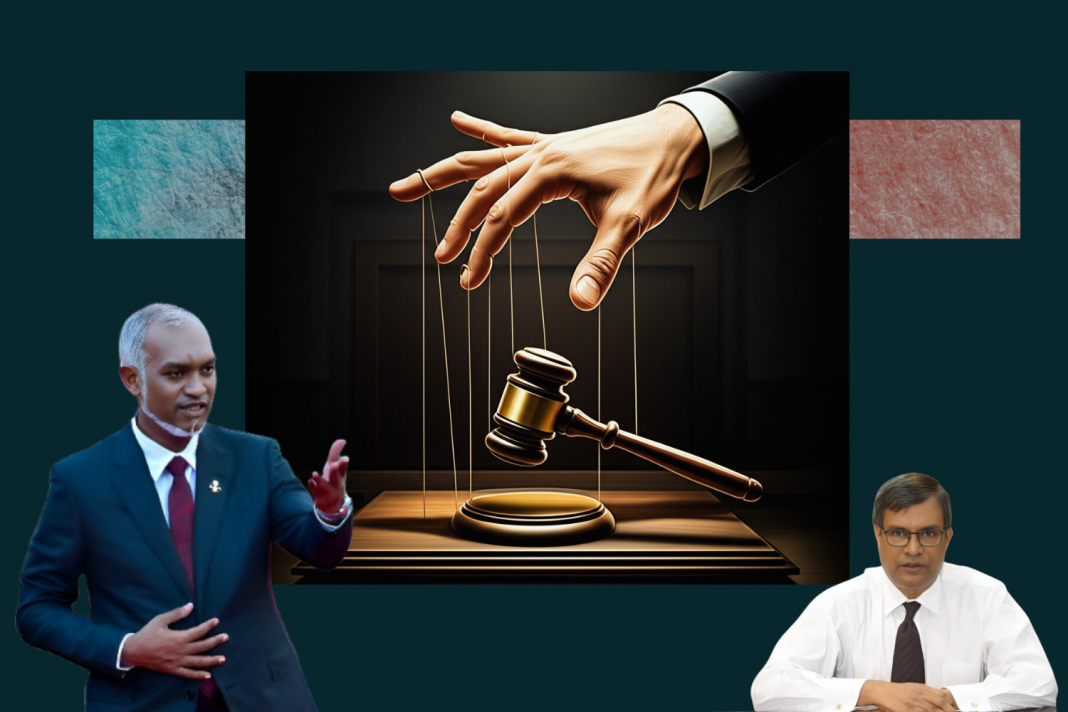President Mohamed Muizzu’s government is causing a big problem for the judiciary. The Judicial Service Commission (JSC) recently suggested major changes to retirement benefits for judges, especially for Chief Justice Muthasim Adnan. This comes after two Supreme Court judges were removed, and another resigned. These actions, which seem like normal changes, are actually part of a plan to increase Muizzu’s control, weaken the courts, and quiet critics, raising concerns from around the world about the state of democracy.
Attacking the Courts
In February 2025, the JSC, which many see as controlled by Muizzu’s People’s National Congress (PNC), suspended Supreme Court Justices Dr. Azmiralda Zahir and Mahaz Ali Zahir. The PNC-led parliament then removed them. Justice Husnu Al Suood also quit, saying he faced too much political pressure. This happened just before the Supreme Court was set to review new laws passed in November 2024. These laws stop lawmakers from switching parties, helping Muizzu’s PNC keep its strong hold on parliament. By removing these judges, Muizzu made sure the court wouldn’t challenge these laws, weakening a key check on his power.
Groups like the United Nations, Transparency International, and Human Rights Watch criticized these moves. They said the suspensions lacked fairness and openness, harming the independence of the courts. They warned that judges now fear punishment if they disagree with the government.
The Retirement Benefits Plan
Now, the JSC wants to change how judges retire. They propose giving retired Chief Justices a one-time payment of MVR 500,000 (about USD 32,500) and a monthly payment of MVR 70,000 (USD 4,500). They also want to count all previous government work, not just time as a judge, to decide who gets these benefits. This would help Chief Justice Muthasim Adnan, who asked to retire on May 8, 2025. Adnan has served as a judge for just over nine years, not enough for the current 10-year rule. But if his 24 years of earlier government work counts, he would get the big payments.
This might look like a plan to support judges, but it’s suspicious. Why focus on the Chief Justice’s benefits now, when the courts are in trouble? It seems Muizzu’s government is trying to push Adnan to retire so they can pick a new Chief Justice who supports them. This fits a pattern in the Maldives, where the JSC has been used to control or remove judges who don’t follow the government’s wishes, like in 2014 and 2018.
The plan also sends a message to other judges: agree with the government, and you’ll be rewarded; disagree, and you might lose your job. This makes it harder for judges to work fairly and independently.
A History of Weakening Democracy
The Maldives has faced many political problems, including coups and unfair elections. Muizzu’s actions follow this trend. The new laws that stop lawmakers from switching parties give his PNC more power in parliament. By controlling the courts through suspensions and now retirement benefits, Muizzu is removing checks on his power, acting like leaders who want total control.
International groups have called this a “serious threat to democracy.” They worry the Maldives could lose support from other countries, like aid or investment. At home, opposition groups and activists are protesting, but Muizzu’s strong control over parliament and other institutions makes it hard for them to fight back.
The Danger of Rewarding Loyalty
The retirement benefits plan raises concerns about fairness. Offering big rewards to judges can make them more likely to support the government while working, hoping for a good payout later. In the Maldives, where the JSC and parliament are closely tied to ruling party, this is a big problem. For example, the changes seem designed to benefit Adnan, which looks like favoritism and hurts trust in the courts.
The JSC’s plan isn’t just about money—it’s part of a bigger attack on democracy. If this continues, the Maldives risks becoming a place where the government controls everything, and the rule of law is ignored. The courts, once a hope for fairness, are at risk. The Maldivian people and the world must pay attention.


















